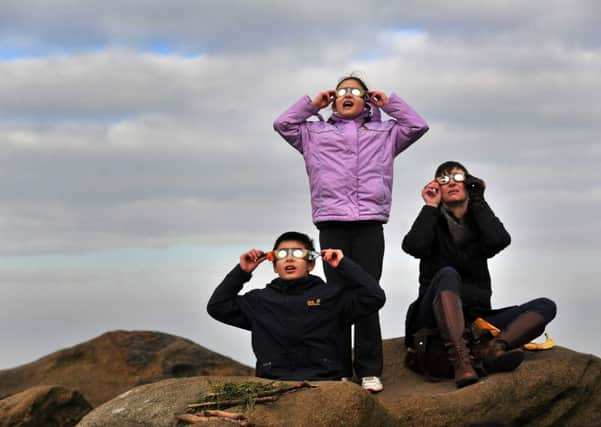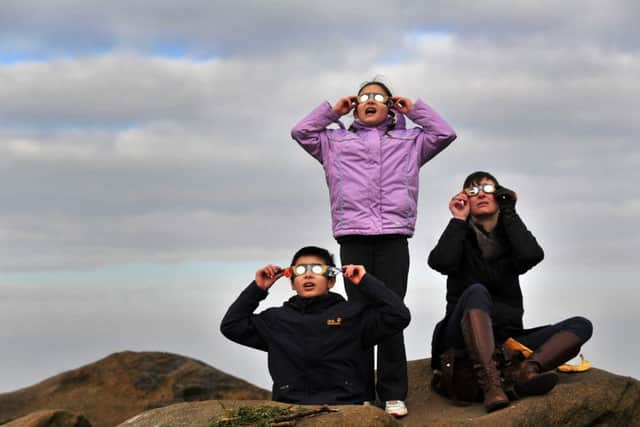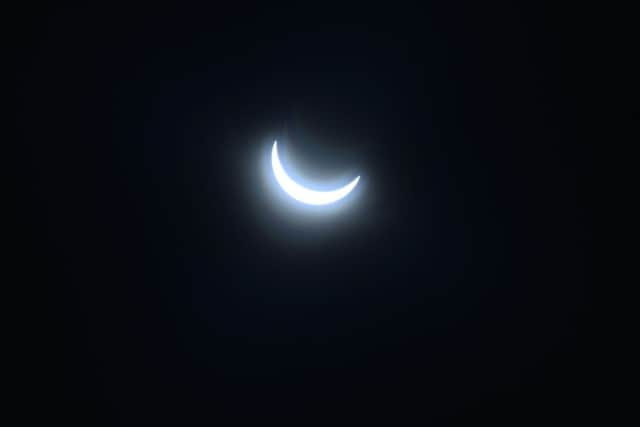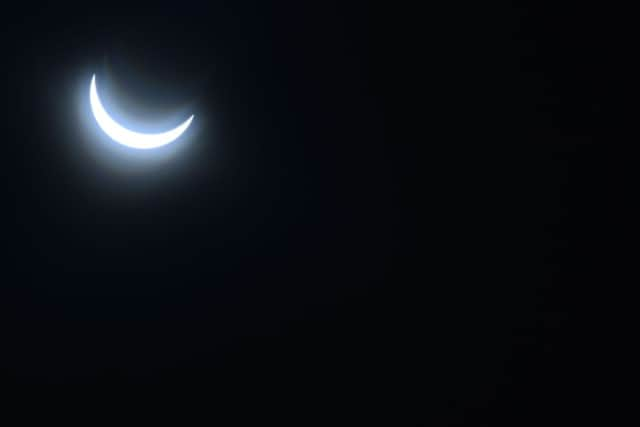Solar eclipse: Did the sky move for you?


But this morning morning that is exactly what millions of people across Britain did, as the country was treated to a near-total solar eclipse.
From the beaches of the North Yorkshire coast to the city centre streets of Leeds, people across Yorkshire stopped to look up and take in the spectacle as the moon crossed in front of the sun, covering around 90 per cent of its face.
As the skies greyed a dawn-like chill came into the air.
Advertisement
Hide AdAdvertisement
Hide AdAnd while cloud may have covered much of the Yorkshire skies, it not stop the majority of the region from getting a good view.
Members of Scarborough and Ryedale Astronomical Society gathered at Scarborough Spa, where the skies were completely clear for the start of the eclipse at 8.33am.
The society’s secretary, Andy Exton, said around 300 people gathered around the spa terrace and cliff area to watch the main event. He said that while clouds did cover the view at some points through the cycle, the cloud cover was beneficial to those wanting to see the spectacle.
“From about 9.15am onwards the clouds were there, but there was some nice gaps, especially at the eclipse maximum at 9.34am,” he said. “The full strength of the sun wasn’t there, which in a way was a bit on a bonus, as everybody was able to enjoy it without the need for special glasses.”
Advertisement
Hide AdAdvertisement
Hide AdMr Exton, who witnessed his first solar eclipse this morning, thinks events like the eclipse and the raising popularity of shows like the BBC’s Stargazing Live will encourage more people to take up the hobby.
“The eclipse was very exciting for me, and worth the wait, he said. “It used to be seen as geeky not so long ago, but now astronomy is cool.”
Around 40 people gathered at West Yorkshire Astronomical Society’s (WYAS) Rosse Observatory at Carleton Grange, Pontefract, where the clouds cleared at the perfect time for those watching the skies.
WYAS committee member Glynn Willock said both society members and the small crowd of members of the public were very pleased with the viewing.


Advertisement
Hide AdAdvertisement
Hide Ad“I arrived just before 8am to set up and we had to wait a little while for the cloud to clear, but it went spot on time, we had clear blue sky for the eclipse itaelf,” he said.
“For us, it’s the nearest we get to going to the moon. It makes you aware of your place in the solar system.”
Across the UK, one of the best vantage points was in South Gloucestershire, where amateur astronomer Ralph Wilkins described the “eerie” feeling as a chilly gloom descended and shadows sharpened.
WYAS holds open evenings at the observatory every Tuesday at 7.30pm. For more information visit www.wyas.org.uk.


Advertisement
Hide AdAdvertisement
Hide AdThroughout history, solar eclipses have been viewed with dread and associated with myths and superstitions. Even today, in the 21st century, some cultures consider them a bad omen.
It is not completely surprising that the phenomenon has been such a source of fear. A total eclipse, especially, can be a disturbing experience - something that appears to undermine nature itself.
During a total eclipse, unlike today’s partial one, darkness falls, the Sun’s shimmering corona becomes visible, and a chill enters the air.
Spookily, birds stop singing, confused by the apparent sudden transition from day to night.
Advertisement
Hide AdAdvertisement
Hide AdTo ancient people who relied so heavily on the life-giving Sun, it must have felt like the end of the world.
This is reflected in a plethora of legends.


In Vietnam, people believed that a giant frog was devouring the Sun, while in ancient China a hungry celestial dragon was thought to be responsible.
According to ancient Hindu mythology, the demon Rahu is beheaded by the supreme deity Vishnu for drinking the nectar of the gods. His head flies across the sky and swallows the Sun.
It was common practice for people to bang pots and pans and make loud noises during an eclipse to scare the demon away.
Advertisement
Hide AdAdvertisement
Hide AdKorean folklore tells of the Sun being stolen by mythical dogs, while in Europe, the Vikings blamed wolves for consuming the Sun.
The ancient Greeks believed a solar eclipse was a sign that the gods were angry, and that it heralded disasters and destruction.
Among modern superstitions is the belief that solar eclipses can be a danger to pregnant women and unborn children. In some cultures, young children and expectant mothers are asked to stay indoors during an eclipse.
In parts of India, people still fast during a solar eclipse because of the fear that any food cooked during the event will be poisoned.
Advertisement
Hide AdAdvertisement
Hide AdA few superstitions offer a positive slant on eclipses. In Italy some believe that flowers planted during a solar eclipse will be brighter and more colourful than at any other time.
The Batammaliba people from Benin and Togo in West Africa have a legend that during an eclipse the Sun and Moon are fighting. The only way to stop the conflict, they believe, is for people on Earth to settle their differences.